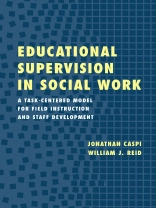This book provides a comprehensive examination of instructional supervision and introduces the Task-Centered Model for Educational Supervision (TCS). It begins by reviewing the history of educational supervision in social work and principles of effective teaching practices in the field. While theories about the principles and purposes of educational supervision abound, it has proven difficult to translate these ideas into a coherent model of supervisory practice.
Educational Supervision in Social Work answers that need, presenting in detail TCS, an ordered series of discrete activities that supervisors and supervisees follow during and between supervision meetings. Designed to promote the continuous attainment of learning and practice objectives, TCS accommodates new models of field instruction, addresses common accountability concerns in social work supervision, and teaches practitioners how to be self-initiating and evaluative. Focusing on the practical implementation of TCS, Caspi and Reed have included detailed case vignettes throughout the book that provide concrete examples of putting theory into practice. Both supervisors of interns and staff as well as supervisees will find TCS a helpful tool in the supervisory process.
Зміст
1. A New Model of Educational Supervision
2. A History of Educational Supervision in Social Work
3. Principles of Effective Instruction
4. The Supervisory Relationship
5. The Person of the Supervisor
6. Preparing for Supervision Beginnings and Endings
7. The Development and Basic Principles of TCS
8, The Social and Direct Teaching Functions of TCS
9. Target Goals
10. Tasks, Obstacles, and Contracting
11. Task Review
12. Applications of TCS
Appendix: TCS Guidelines
Про автора
Jonathan Caspi is assistant professor in the department of human ecology at Montclair State University in New Jersey. William J. Reid is Distinguished Professor, School of Social Welfare, the State University of New York at Albany.












